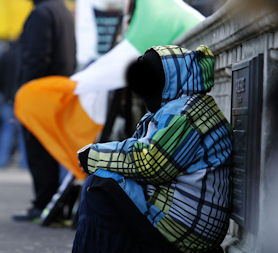Ireland considers applying for EU aid for banks
Ireland considers applying for European Union aid to help its banks in a bid to avoid having to rely on a full EU bailout. Economics Editor Faisal Islam asks whether Britain should step in.
The Irish government has not ruled out the possibility of applying for an EU funded bailout, but has insisted no application has been made yet, as pressure mounts on the Eurozone nation.
Justice Minister Dermot Ahern said yesterday in an interview with RTE’s The Week in Politics that “things are happening day by day”. He refused to rule out an application for European aid.
The Department of Finance said in a written statement that there are ongoing contacts with international colleagues “in light of current market conditions” but it repeated that no application had been made for assistance.
Over the weekend EU sources have said that talks on a possible bailout are underway and that Ireland, with rocketing borrowing costs, is unlikely to hold out without assistance.

The EU wants Ireland to accept aid according to sources, in order to avert a similar economic crash to Greece, where budget problems in that one country forced the whole of the eurozone into crisis.
But Mr Ahern said any reports Ireland is about to apply for aid and is in talks are “fiction”.
He said: “There are no negotiations going on. If there were, the government would be aware of it, and we are not aware of it,” adding that he had spoken to Prime Minister Brian Cowen on Sunday and to Finance Minister Brian Lenihan.
Should Britain help bail-out Ireland?
"Greece is not Ireland," was the not-totally-independent view from Greece's Finance Minister to a London financial audience last week, writes Economics Editor Faisal Islam.
All of which helped contribute to a further descent down the loop of doom that seems to be enveloping the Emerald Isle.
My sense is that, although something needs to be done, it is rather late in the day to be expecting much – beyond rhetoric – out of the meetings of European finance ministers tomorrow and Wednesday.
The response of Dublin, as we head foursquare towards some sort of external bailout, is a rather tenuous attempt to distinguish between bailout of Ireland's sovereign debt, which it says is un-needed, and a further bailout of its banks, which is needed without doubt.
Read more and have your say
Following Greece
If Ireland does take up aid from the EU it will be the second eurozone country to do so following Greece. However, other Irish cabinet ministers said yesterday that Ireland is not like Greece in that it is funded until mid-2011 and therefore does not need assistance.
The Minister of Enterprise Batt O’Keeffe said: “It’s been a very hard-won sovereignty for this country and this government is not going to give over that sovereignty to anyone.”
He added that the International Monetary Fund (IMF) had stated it believed Ireland could manage on its own.
The EU’s chief paymaster Germany, has said it is not exerting pressure on Ireland to accept aid.
However, EU sources said the range of aid under discussion is between 45 to 90 billion Euros. This depends on whether Ireland needs support for its banks, which plunged into debt by the financial crisis and the property market crash.
The EU bailout mechanism would form the basis of such aid, if it was needed, or it may come from the 440 billion Euro European Financial Stability Facility (EFSF) which was set up after Greece was forced to seek help in May.
Confusion in Dublin
At first they denied there had been any contact with the European Central Bank, writes economic analyst Peter Stafford.
Then they admitted there had been talks, but there was no discussion of a bailout. Then, by Friday, the Government admitted that some "theoretical" talks had taken place between officials over the possibility of Ireland accessing external financial aid.
By the time the markets opened this morning, the Government said that the talks between the Department of Finance and European officials had been "technical" in scope only, and there has been no application for a bailout. At the time of writing, it's not clear what the next steps for the talks are, other than actual exchanges of money.
Read more